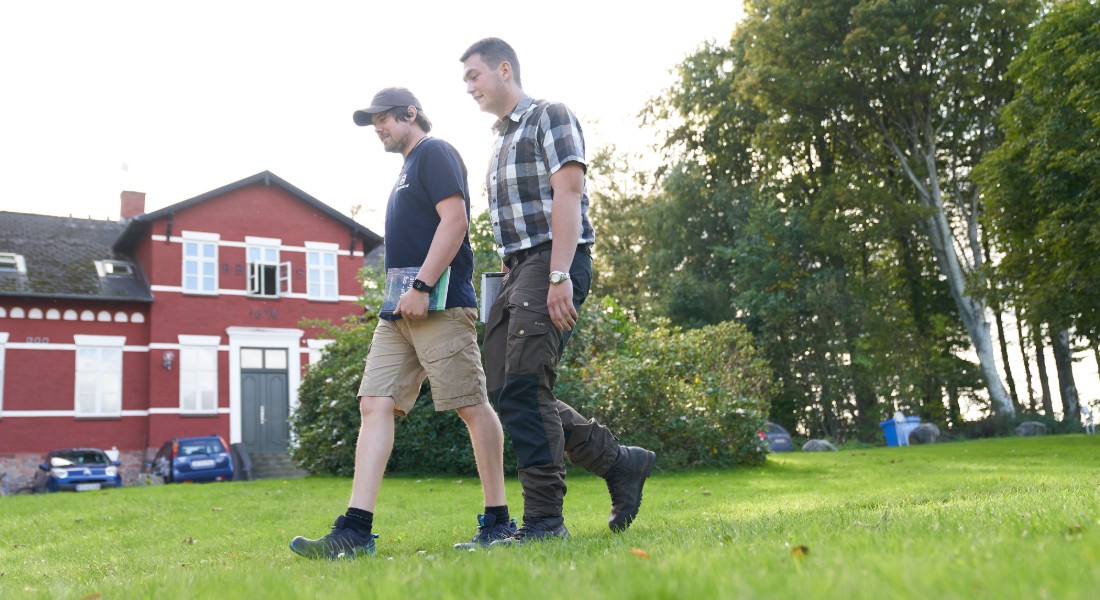Study start: Forestry and natural resources are hits among climate-conscious youth
At a time of changing climate and threats to biodiversity, there is an ever-increasing interest among young people for programmes of study that prepare them for making a difference. This year, the University of Copenhagen has witnessed a marked increase in the number of applicants for two of its 'greenest' programmes, Forestry and Landscape Engineering and Natural Resources.

Nature, environment and climate are important concerns among Danes. And in particular, for a new generation of students. This year, the University of Copenhagen’s Faculty of Science witnessed immense interest in two of its 'greenest' bachelor programmes.
Specifically, applicant numbers for the Forestry and Landscape Engineer and Natural Resource programmes have risen by 78 percent and 38 percent respectively, compared to 2019. An increase which, according to Thomas Færgeman, Principal of the Forest and Landscape Colleges in Nødebo, Zealand and Auning, Central Jutland, aligns with the spirit of time among youth:
"Growing up during a time when climate challenges are paramount might well lead to apathy among some. However, I think that the opportunity to do something concrete, such as planting a forest and managing nature, to help climate and preserve biodiversity, speaks to many," says Thomas Færgeman, principal of the Forest and Landscape College.
New programme, in the middle of a Djursland forest
The Auning Forest and Landscape College is located in the middle of a 3000-hectare Danish forest called Løvenholm. This marks the first time that students are able train to become a Forestry and Landscape Engineer in Jutland. In the past, students needed to relocate to the Forest and Landscape College’s North Zealand location, in Nødebo.
The Forest and Landscape College in Auning has received 84 applicants for 38 slots this year.
"Two thirds of Forestry and Landscape Engineer graduates live and work west of the Great Belt. Thus, it makes sense to extend the programme to Jutland. We are thrilled about the high demand for our new programme in Auning," says Thomas Færgeman
Roughly one-third of Forestry and Landscape Engineer graduates find employment as foresters, where they manage public or private forests. Another third work in municipalities, where they might manage natural settings in urban areas, such as parks. The remainder of graduates are engaged in a variety of activities, with some being self-employed.
Feeling the responsibility to address global problems
The bachelor programme in Natural Resources experienced a 37.9 percent increase in the number of applicants over 2019. According to head of study Kristian Holst Laursen, there is no doubt that mounting interest in the programme reflects a heightened focus among youth about climate and environmental issues:
"We are experiencing a growing interest in green transitions and sustainability. Accordingly, we are admitting many highly motivated and committed young people to the programme, youth who feel an enormous responsibility to address the global issues that we are facing as a society."
A Bachelor’s degree in Natural Resources allows students to pursue a master's degree and specialize in Plant Science, Environmental Science, Nature Resources Management and Environmental Economics. These programmes equip them for a wide range of "green" jobs in municipalities, government agencies, consulting engineering companies or agriculture.
"It is a solution-oriented programme that deals with managing the earth's resources as responsibly as possible in relation to climate, environment and food production," says Kristian Holst Laursen.
On 1 September, 95 new students began their bachelor programmes in Natural Resources.
Facts:
- The Forestry and Landscape Engineer programme in Nødebo had 178 applicants this year, a 78% increase over the 67 applications received in 2019. 55 new students began their studies at the Forest and Landscape College in Nødebo on 1 September.
- The new Forestry and Landscape Engineer programme in Auning, Jutland had 84 applicants for 38 slots this year. The programme began on 1 September.
- Employment rates among Forestry and Landscape Engineer graduates are high. Only 10% of graduates are unemployed or out of the labour force after one year. This statistic falls to less than 5% in years 2 and 3. And after 4 years, all graduates are employed.
- Natural Resources received 251 applications this year, an increase of 37.9% compared to the 182 received in 2019.
- On 1 September, 95 new students began their bachelor programmes in Natural Resources.
Related News
Contact
Thomas Færgeman
Forstander på Skovskolen
Institut for Geovidenskab- og Naturforvaltning
Københavns Universitet
Mail: thf@ign.ku.dk
Mobil: 31 65 31 00
Kristian Holst Laursen
Studieleder på Naturressourcer
Institut for Plante- og Miljøvidenskab
Københavns Universitet
Mail: holst@plen.ku.dk
Telefon: 35 33 37 28
Michael Skov Jensen
Journalist
SCIENCE
Mail: msj@science.ku.dk
Mobil: 93 56 58 97
